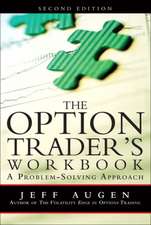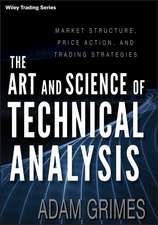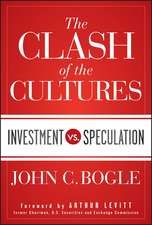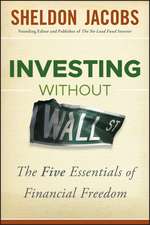Dynamic Asset Allocation with Forwards and Futures
Autor Abraham Lioui, Patrice Ponceten Limba Engleză Hardback – 30 mar 2005
| Toate formatele și edițiile | Preț | Express |
|---|---|---|
| Paperback (1) | 634.14 lei 43-57 zile | |
| Springer Us – 29 oct 2010 | 634.14 lei 43-57 zile | |
| Hardback (1) | 647.40 lei 43-57 zile | |
| Springer Us – 30 mar 2005 | 647.40 lei 43-57 zile |
Preț: 647.40 lei
Preț vechi: 761.65 lei
-15% Nou
Puncte Express: 971
Preț estimativ în valută:
123.88€ • 129.69$ • 102.50£
123.88€ • 129.69$ • 102.50£
Carte tipărită la comandă
Livrare economică 07-21 aprilie
Preluare comenzi: 021 569.72.76
Specificații
ISBN-13: 9780387241074
ISBN-10: 0387241078
Pagini: 264
Ilustrații: XVIII, 264 p.
Dimensiuni: 155 x 235 x 23 mm
Greutate: 0.61 kg
Ediția:2005
Editura: Springer Us
Colecția Springer
Locul publicării:New York, NY, United States
ISBN-10: 0387241078
Pagini: 264
Ilustrații: XVIII, 264 p.
Dimensiuni: 155 x 235 x 23 mm
Greutate: 0.61 kg
Ediția:2005
Editura: Springer Us
Colecția Springer
Locul publicării:New York, NY, United States
Public țintă
ResearchCuprins
The Basics.- Forward and Futures Markets.- Standard Pricing Results under Deterministic and Stochastic Interest Rates.- Investment and Hedging.- Pure Hedging.- Optimal Dynamic Portfolio Choice in Complete Markets.- Optimal Dynamic Portfolio Choice in Incomplete Markets.- Optimal Currency Risk Hedging.- Optimal Spreading.- Pricing and Hedging under Stochastic Dividend or Convenience Yield.- General Equilibrium Pricing.- Equilibrium Asset Pricing in an Endowment Economy with Non-Redundant Forward or Futures Contracts.- Equilibrium Asset Pricing in a Production Economy with Non-Redundant Forward or Futures Contracts.- General Equilibrium Pricing of Futures and Forward Contracts Written on the CPI.
Textul de pe ultima copertă
DYNAMIC ASSET ALLOCATION WITH FORWARD AND FUTURES is an advanced text on the theory of forward and futures markets which aims at providing readers with a comprehensive knowledge of how prices are established and evolve over time, what optimal strategies one can expect from the participants, what characterizes such markets, and what major theoretical and practical differences distinguish futures from forward contracts.
The book proposes an approach of these markets from the perspective of dynamic asset allocation and asset pricing theory within an inter-temporal framework. The main ingredients that are used are the assumed absence of frictions and arbitrage opportunities in financial and real markets, the uniqueness of the economic general equilibrium, when such an equilibrium is required and the tools of continuous time finance, namely martingale theory and stochastic dynamic programming.
The scope of DYNAMIC ASSET ALLOCATION WITH FORWARD AND FUTURES is essentially theoretical, with emphasis on economic meaning and financial interpretation. Regarding investment and/or hedging, focus is on optimal strategies rather than on actual practice. Simulations, however, are performed when important insights can be delivered as to the practical relevance of some theoretical results. Also, optimal strategies using futures are shown to differ markedly from those using forwards. The following issues are examined: pure hedging, investment and hedging in complete or incomplete markets, currency risk, optimal spreading, presence of stochastic dividend or convenience yields, pricing of non-redundant futures or forwards by means of general equilibrium analysis, and revisiting of existing Capital Asset Pricing Models.
The book proposes an approach of these markets from the perspective of dynamic asset allocation and asset pricing theory within an inter-temporal framework. The main ingredients that are used are the assumed absence of frictions and arbitrage opportunities in financial and real markets, the uniqueness of the economic general equilibrium, when such an equilibrium is required and the tools of continuous time finance, namely martingale theory and stochastic dynamic programming.
The scope of DYNAMIC ASSET ALLOCATION WITH FORWARD AND FUTURES is essentially theoretical, with emphasis on economic meaning and financial interpretation. Regarding investment and/or hedging, focus is on optimal strategies rather than on actual practice. Simulations, however, are performed when important insights can be delivered as to the practical relevance of some theoretical results. Also, optimal strategies using futures are shown to differ markedly from those using forwards. The following issues are examined: pure hedging, investment and hedging in complete or incomplete markets, currency risk, optimal spreading, presence of stochastic dividend or convenience yields, pricing of non-redundant futures or forwards by means of general equilibrium analysis, and revisiting of existing Capital Asset Pricing Models.
Caracteristici
Advanced text on the theory of forward and futures markets, in-between a streamlined textbook and a research monograph Emphasis is on economic meaning and financial interpretation rather than on mathematical rigor, also theoretical and practical differences between strategies using futures and those using forwards Includes supplementary material: sn.pub/extras















